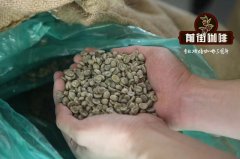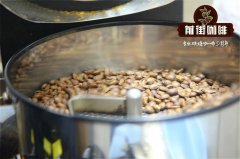Brazilian Coffee Bean Brand recommends Brazilian Santos Yellow bourbon Coffee Variety Story Flavor

Professional coffee knowledge exchange more coffee bean information please follow the coffee workshop (Wechat official account cafe_style)
Because of the wide variety of Brazilian coffee, we can't just use the word "Brazilian coffee" to include it. The vast majority of Brazilian coffee is unwashed and sun-dried and is classified according to the name of the state of origin and the port of transport. Brazil has 21 states and 17 states produce coffee, but four of them produce the most, accounting for 98% of the country's total output. They are Parana, Sao Paulo, Milas Gerais and Esp í rito Santo. The southern state of Parana has the most astonishing production, accounting for 50% of the total. Although coffee is diverse, Brazilian coffee is suitable for the taste of the public.
The taste of Brazilian coffee has a low sour taste, with the sweet and bitter taste of coffee, the entrance is very smooth, but also with a hint of grass aroma, slightly bitter in the fragrance, smooth and smooth, with a pleasant aftertaste. There are no outstanding advantages for Brazilian coffee, but there are no obvious defects. The taste is mild and smooth, the acidity is low, the mellow is moderate, and there is a hint of sweetness. All these soft flavors are mixed together. To distinguish them one by one is the best test for the taste buds, which is why many Santos fans love this kind of coffee, just because it is so mild and ordinary. Santos is suitable for ordinary baking, suitable for brewing in the most popular way, and is the best raw material for making Italian espresso and all kinds of fancy coffee.
One of the most famous is Sandos Coffee, which tastes mellow and neutral. It can be boiled directly or mixed with other kinds of coffee beans to form a comprehensive coffee. It is also a good choice.
Santos, especially Bourbon bour bon Santos (named after the French colonial island Bourbon bour bon. Bourbon is now known as R é union, where the coffee saplings that brought Para were planted). It is famous for its mellow, flawless and neutral taste.
The so-called bourbon species is native to the island of Reunion in the Indian Ocean. The green fruit appears bright red when ripe.
On the other hand, the yellow bourbon species is a hybrid between the bourbon species and other varieties, and the fruit is yellow when the fruit is ripe.
Because the cultivated yellow bourbon species has low yield and is not resistant to wind and rain, it has not been widely planted. But...
It has an excellent flavor when planted at high altitude, and it is more common in recent years.
The size of raw beans is slightly smaller, but the appearance is quite good, the appearance is yellowish green and there are very few defective beans.
Half-sun treatment was adopted.
Flavor characteristics:
Brazilian coffee is named after its port (Santos), Brazil Santos, which accounts for about 1 per cent of the world's total coffee production and occupies a pivotal position in the global overall trading market.
Therefore, the coffee produced is of uniform quality and is generally considered to be an indispensable coffee bean for mixing and blending. It tastes round and neutral with moderate sour taste.
Characteristics of origin:
Brazil, which can be called the "coffee continent", is the world's largest coffee producer and exporter, accounting for about 1% of the world's total output. It is especially famous for Brazilian Brazil Santos, which is exported from Santos port in Sao Paulo state. The raw beans are large, light green or yellowish.
Brazilian Santos, with a mild flavor, is suitable for those who first come into contact with coffee and can drink a touch of sweetness without adding sugar. Acidity and bitterness can be mixed by baking, and it is often used as the base for blending mixed coffee or mamba or Mamba coffee.
END
Important Notice :
前街咖啡 FrontStreet Coffee has moved to new addredd:
FrontStreet Coffee Address: 315,Donghua East Road,GuangZhou
Tel:020 38364473
- Prev

Brazilian Santos Coffee Picture Brazilian Santos Coffee Flavor description Brazilian Santos Coffee is delicious
Professional coffee knowledge exchange more coffee bean information please follow the coffee workshop (Wechat official account cafe_style) Brazil, which can be known as the coffee continent of the world's largest coffee producer and exporter, accounting for about 1 inch of all world production. Brazil's Brazil Santos is especially famous for its export from Santos Port in Sao Paulo. The raw beans are large, light green or green.
- Next

Brazilian Santos baking temperature and time record table how to bake Brazilian Santos is the most suitable?
Professional coffee knowledge exchange more coffee bean information please follow the coffee workshop (Wechat official account cafe_style) Brazil's two famous products, football and coffee, Santos is a kind of coffee with high C / P value! After years of experience in guessing and planting, the Brazilian Santos is named after the port it produces. This is a bean with a well-balanced sweet taste and aroma, neither bitter nor sour.
Related
- Detailed explanation of Jadeite planting Land in Panamanian Jadeite Manor introduction to the grading system of Jadeite competitive bidding, Red bid, Green bid and Rose Summer
- Story of Coffee planting in Brenka region of Costa Rica Stonehenge Manor anaerobic heavy honey treatment of flavor mouth
- What's on the barrel of Blue Mountain Coffee beans?
- Can American coffee also pull flowers? How to use hot American style to pull out a good-looking pattern?
- Can you make a cold extract with coffee beans? What is the right proportion for cold-extracted coffee formula?
- Indonesian PWN Gold Mandrine Coffee Origin Features Flavor How to Chong? Mandolin coffee is American.
- A brief introduction to the flavor characteristics of Brazilian yellow bourbon coffee beans
- What is the effect of different water quality on the flavor of cold-extracted coffee? What kind of water is best for brewing coffee?
- Why do you think of Rose Summer whenever you mention Panamanian coffee?
- Introduction to the characteristics of authentic blue mountain coffee bean producing areas? What is the CIB Coffee Authority in Jamaica?

